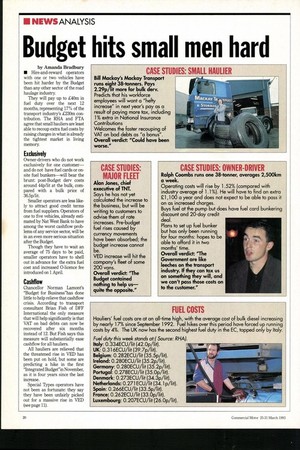Budget hits small men hard
Page 22

If you've noticed an error in this article please click here to report it so we can fix it.
by Amanda Bradbury • Hire-and-reward operators with one or two vehicles have been hit harder by the Budget than any other sector of the road haulage industry They will pay up to DIOm in fuel duty over the next 12 months, representing 17% of the transport industry's £230m contribution. The RHA and FTA agree that small hauliers are least able to recoup extra fuel costs by raising charges in what is already the tightest market in living memory.
Exclusively Owner-drivers who do not work exclusively for one customer— and do not have fuel cards or onsite fuel bunkers—will bear the brunt: post-Budget dery costs around 44p/lit at the bulk, compared with a bulk price of 36.5p/lit.
Smaller operators are less likely to attract good credit terms from fuel suppliers. Operators of one to five vehicles, already estimated by Nat West Bank to have among the worst cashflow problems of any service sector, will be in an even more serious situation after the Budget.
Though they have to wait an average of 75 days to be paid, smaller operators have to shell out in advance for the extra fuel cost and increased 0-licence fee introduced on 1 April.
Cashf low Chancellor Norman Lamont's "Budget for Business"has done little to help relieve that cashflow crisis. According to transport consultant Brian Fish of DFF International the only measure that will help significantly is that VAT on bad debts can now be recovered after six months instead of 12. But Fish says this measure will substantially ease cashflow for all hauliers.
All hauliers are relieved that the threatened rise in VED has been put on hold, but some are predicting a hike in the first "Integrated Budget"in November, as it is four years since the last increase.
Special Types operators have not been as fortunate: they say they have been unfairly picked out for a massive rise in VED (see page 11).
CASE STUDIES: SMALL HAULIER Bill Mackay's Mackay Transport runs eight 38-tonners. Pays 2.29p/lit more for bulk derv. Predicts that his workforce employees will want a "hefty increase" in next year's pay as a result of paying more tax, including 1% extra in National Insurance Contributions Welcomes the faster recouping of VAT on bad debts as "a bonus". Overall verdict: "Could have been worse."
CASE STUDIES: MAJOR FLEET Alan Jones, chief executive of TNT. Says he has not yet calculated the increase to the business, but will be writing to customers to advise them of rate increases. Pre-budget fuel rises caused by currency movements have been absorbed; the budget increase cannot be.
VED increase will hit the company's fleet of some 200 vans.
Overall verdict: "The Budget contained nothing to help us— quite the opposite."
CASE STUDIES: OWNER-DRIVER Ralph Coombs runs one 38-tonner, averages 2,500km a week.
Operating costs will rise by 1.52% (compared with industry average of 1.1%). He will have to find an extra 21,100 a year and does not expect to be able to pass it on as increased charges.
Buys fuel at the pump but does have fuel card bunkering discount and 20-day credit deal.
Plans to set up fuel bunker but has only been running for four months: hopes to be able to afford it in two months' time.
Overall verdict: "The Government are like leeches on the transport industry. If they can tax us on something they will, and we can't pass those costs on to the customer."
Hauliers' fuel costs are at an all-time high, with the average cost of bulk diesel increasing by nearly 17% since September 1992. Fuel hikes over this period have forced up running costs by 4%. The UK now has the second highest fuel duty in the EC, topped only by Italy.
Fuel duly this week stands at:( Source: RHA).
Italy: 0.334ECU/lit (42.0p/lit). UK: 0.316ECU/lit (39.7p/lit). Belgium: 0.282ECU/lit (35.5p/lit). Ireland: 0.280ECU/lit (35.2p/lit). Germany: 0.280ECU/lit (35.2p/lit). Portugal: 0.278ECU/lit (35.0p/lit). Denmark: 0.273ECU/lit (34.3p/lit). Netherlands: 0.271ECU/lit (34.1p/lit). Spain: 0.266ECU/lit (33.5p/lit). France: 0.262ECU/lit (33.0p/lit). Luxembourg: 0.207ECU/lit (26.0p/lit).




















































































